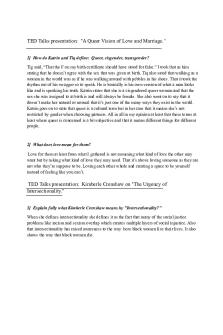Video #2 Prompts The Plea PDF

| Title | Video #2 Prompts The Plea |
|---|---|
| Author | Krysten |
| Course | Introduction to Criminal Justice |
| Institution | Texas A&M University-Commerce |
| Pages | 6 |
| File Size | 121.2 KB |
| File Type | |
| Total Downloads | 15 |
| Total Views | 192 |
Summary
Download Video #2 Prompts The Plea PDF
Description
Video #2 Response Name: Date:
Frontline: The Plea http://video.pbs.org/video/2216784391/ * Your computer must have either Windows Media Player or RealPlayer to play the video. * Respond to these short-answer questions in critical essay format, with complete sentences and at least one paragraph [50 words or more] per response.
1. Do you agree with Judge Caprice Cosper that “the system would just entirely collapse” if every case in the criminal justice system received a trial by jury? Why or why not? I do not agree with Judge Caprice Cosper that “the system would just entirely collapse” if every case in the criminal justice system received a trial by jury. I do not agree because every case deserves to be heard. If every case is not heard it exceeds the rights of citizens. Although I do not agree with Judge Cosper about the system collapsing, I do feel as if the system would get extremely backed up. 2. Do you believe court-appointed lawyers/public defenders help or hurt whom they are appointed to? Use the experiences of Regina Kelly and Erma Stewart as examples. To be honest I believe court-appointed lawyers/public defenders do not care if they are helping or hurting whom they are appointed to. I believe they care more about just getting the case over with as soon as possible. Using the experiences of Regina Kelly and Erma Stewart, both women said that their lawyers came to them with plea bargains, without even hearing their stories. As a defense attorney, no matter how you get your client, you should always make your clients your 1st priority. I understand defense attorneys are swamped in paperwork and have multiple clients at once, but they chose that job. 3. Do you agree with Steve Bright, Director of the Southern Center for Human Rights, that people who plead guilty, are convicted and then placed on probation are “set up to fail?” Why or why not? Use the experience of Michael Wells as an example. I do not agree with Steve Bright, that people who plead guilty, are convicted and then placed on probation are “set up to fail?”. However, I do believe that being “set up to fail” is based on the society or environment the convict lives in. People with less, struggle with getting back on their feet. Michael Wells was poor, on probation. Fines come with probation and poor minorities are basically stuck in a merry-go-round of jail time. 4. What is your reaction to the remaining Hearne “drug bust” cases that were dismissed after the informant was found not to be credible? What does this say about those who did plea bargain?
The Hearne drug bust cases show me that courts in many jurisdictions have become a financially run institutions that only care about the money they squeeze out of defendants. The Hearne drug bust cases show me that courts in many jurisdictions have become a financially run institutions that only care about the money they squeeze out of defendants.
The Hearne drug bust cases show me that courts in many jurisdictions have become a financially run institutions that only care about the money they squeeze out of defendants. The Hearne drug bust cases show me that courts in many jurisdictions have become a financially run institutions that only care about the money they squeeze out of defendants.
The Hearne drug bust cases show me that courts in many jurisdictions have become a financially run institutions that only care about the money they squeeze out of defendants. The Hearne drug bust cases show me that courts in many jurisdictions have become a financially run institutions that only care about the money they squeeze out of defendants.
The Hearne drug bust cases show me that courts in many jurisdictions have become a financially run institutions that only care about the money they squeeze out of defendants. The Hearne drug bust cases show me that courts in many jurisdictions have become a financially run institutions that only care about the money they squeeze out of defendants. Considered guilty after a case is dropped because you plead guilty with a plea bargain is crappy. The Hearne “drug bust” cases show that courts in many jurisdictions only care about how much money they can receive and not much about the clients.
5. Do you believe that defendants should always have a role in plea bargaining discussions, or should such discussions only involve judges, lawyers and/or victims. Use the experience of Charles Gampero, Jr. as an example. I believe restorative justice should happen. The defendant, along with judges, lawyers and/or victims should always have a role in plea bargaining discussions. Charlie Gampero, Jr. was not informed of his plea baragin until the day of trial. He was found guilty to murder without any hard evidence and he never got to tell his story.
6. What is your reaction to Kerry Max Cook’s “no contest” plea? It saddens me that Cook’s was incarcerated for 22 years, even though he was innocent. Cook’s did not plead guilty because he just could not plead guilty to rape and murder when he did not rape or murder anyone. I agree with Cook’s on his “no consent” plea 100 percent. 7. What is your reaction to Kelly Jarrett’s decision to not take a plea bargain? Kelly Jarrett’s decision to not take a plea deal was heroic of her. Even though she spent majority of her life in prison for a crime she did not commit, it was honorable because she did not settle. In addition to her not settling, she was offered her freedom, but still viewing accepting the plea bargain as lying and fraud, she could not accept it.
8. Based on these cases, what is your opinion of plea bargaining overall? Is it necessary in some cases or is it a coercive tactic? Plea bargaining overall is just a coercive tactic for defense attorneys to push cases through as soon as possible and receive as much money as they can....
Similar Free PDFs

Video #2 Prompts The Plea
- 6 Pages

Ransom and The Queen Prompts
- 2 Pages

365 Writing Prompts - nothing
- 19 Pages

Plea bargaining essay
- 8 Pages

IBM4112 Video Assignment 2
- 2 Pages

Video 2 Quiz
- 1 Pages

Video Quiz #2
- 2 Pages

For video quiz #2
- 18 Pages

Parasite Movie Journal Prompts
- 4 Pages

Section 112-PLEA OF GUILT
- 2 Pages

THE MOT Dangerous GAME - Video
- 8 Pages

N the Video One - vedio
- 2 Pages
Popular Institutions
- Tinajero National High School - Annex
- Politeknik Caltex Riau
- Yokohama City University
- SGT University
- University of Al-Qadisiyah
- Divine Word College of Vigan
- Techniek College Rotterdam
- Universidade de Santiago
- Universiti Teknologi MARA Cawangan Johor Kampus Pasir Gudang
- Poltekkes Kemenkes Yogyakarta
- Baguio City National High School
- Colegio san marcos
- preparatoria uno
- Centro de Bachillerato Tecnológico Industrial y de Servicios No. 107
- Dalian Maritime University
- Quang Trung Secondary School
- Colegio Tecnológico en Informática
- Corporación Regional de Educación Superior
- Grupo CEDVA
- Dar Al Uloom University
- Centro de Estudios Preuniversitarios de la Universidad Nacional de Ingeniería
- 上智大学
- Aakash International School, Nuna Majara
- San Felipe Neri Catholic School
- Kang Chiao International School - New Taipei City
- Misamis Occidental National High School
- Institución Educativa Escuela Normal Juan Ladrilleros
- Kolehiyo ng Pantukan
- Batanes State College
- Instituto Continental
- Sekolah Menengah Kejuruan Kesehatan Kaltara (Tarakan)
- Colegio de La Inmaculada Concepcion - Cebu



